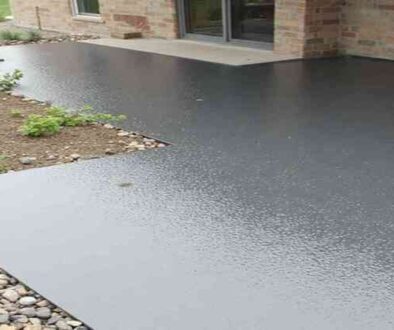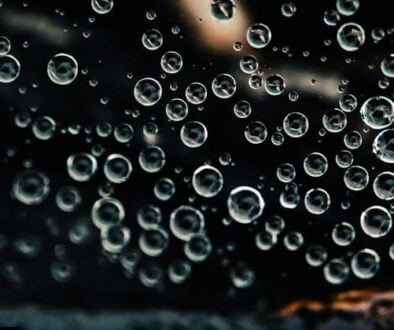Which Concrete Sealers are Best for Patios, Driveways, Pool Decks, and Garages

Last updated on April 6th, 2022
Which type of sealers should you use for your concrete patio, driveway, walkway, pool deck, or garage floor?
It highly depends on many factors such as the location, exposure, and concrete properties. However, we will briefly discuss an opinion for each application.
You can find more about how these factors affect your choice of sealer in the following article, “How to Choose the Best Sealers for Concrete Floors“.
Concrete sealers for patios and walkways

– For concrete patios and walkways in a moderate to warm climate, you can use film-forming sealers such as acrylic or polyurethane, or penetrating sealers (water or water and oil repellents).
Acrylic film forming sealers for concrete patios and concrete walkways
An acrylic film-forming sealer will perform well at a low cost. In fact, it is the cheapest solution in terms of initial cost. The main benefits of acrylic in such conditions is that it is breathable, provides protection, and enhances the appearance of a concrete patio or walkway, giving it a “wet look”, at a low cost. Actually, this made acrylic a popular concrete patio sealer.
Furthermore, it is very common for patios to have a stamped concrete decorative finish. And with stamped concrete, aesthetics or appearance is often a priority. Hence, acrylic is also often used as a stamped concrete patio sealer.
In general, it is better to choose a solvent based and not a water based acrylic sealer. However, basic quality acrylic sealers can generally last for less than 3 years on concrete patios, and a little less on walkways.
Polyurethane film forming sealers for concrete patios and concrete walkways
A polyurethane film-forming sealer usually performs better than acrylic. In fact, polyurethane sealers are about as twice as thick as acrylics, can last longer, and are more durable and resistant. In addition, similar to acrylic, polyurethane also gives a “wet look” to the concrete. However, its initial total cost is generally about double or triple of that of the acrylic. But, it usually lasts about 6 to 10 years, and thereby it may actually cost less than the acrylic on the long term.
However, you should consider two major parameters with polyurethane sealers for patios and walkways.
First, they are not usually breathable. Hence, for applications where hydrostatic water pressure is present, or where moisture can be entrapped, fogging can occur. In fact, breathability is an important property of a good concrete patio sealer, especially where moisture issues are present. Thereby, you should either avoid polyurethanes or ensure that the product is breathable in such a case.
Second, the application of polyurethane requires professionals to avoid common mistakes which are often costly and not easy to repair. Professionals should consider the solids content, application method, coating thickness, type and porosity of the concrete, and the moisture content.
Penetrating sealers (water or water and oil repellents) for concrete patios and walkways
A penetrating sealer is also a great choice for similar conditions. In general, it is the best choice when you do not want to change the appearance of concrete. However, many homeowners prefer the “wet look” effect of a film-forming concrete patio sealer, since it enhances the colors and overall appearance. Usually, basic quality penetrating sealers last about 5 to 10 years (pure Siloxanes about 3 years). In addition, they provide great overall durability and resistance. However, it is important to choose the right type of this type of sealers based mainly on the porosity of concrete. Generally, Silane/Siloxane blends have a good cost, coverage rate, and provide good durability for most projects.
– For concrete patios and walkways in a cold climate, subjected to frequent freeze and thaw cycles, penetrating sealers (water or water and oil repellents) are unquestionably the best solution. However, usually penetrating sealers do not give the glossy look or enhanced appearance, which most customers look for. If this is the case, you can apply a penetrating sealer and a film-forming sealer. However, it is important to check the product specifications or check with the supplier for compatibility. As a rule of thumb, never apply a water based film-forming sealer over a solvent based penetrating sealer, since usually they will have a weak bond. Furthermore, some relatively new penetrating sealers can give a slight enhanced appearance to concrete.
Sealers for driveways

– For concrete driveways in a moderate to warm climate, you can also use film-forming sealers such as acrylic or polyurethane, or penetrating sealers.
However, the main difference between a concrete patio or walkway and a concrete driveway is that the latter is exposed to harsher conditions. For instance, driveways are often exposed to salts, various chemicals, oils, hot tires, and abrasion.
Acrylic film forming sealers for concrete driveways
In addition to what we mentioned about acrylic sealers in the concrete patio or walkway section, it is important to consider the following additional aspects.
First, an acrylic sealer will certainly wear out much faster on a driveway, due to the tire loads, abrasion, chemicals, and salts.
Second, an acrylic sealer usually, similar to other film-forming sealers, can reduce traction in the presence of water or oil, making the driveway more slippery. However, safety is an important aspect in driveways. Hence, a skid-resistant additive may be necessary.
Third, an acrylic sealer is usually less resistant to tire marks. Thereby, it is important to choose a high quality sealer with a high solid contents to reduce the probability of tire marks.
Polyurethane film forming sealers for concrete driveways
We already mentioned the important properties of polyurethane sealers in the previous section, about concrete patios and walkways.
The main additional parameters to consider are that polyurethane coatings are much thicker than those of acrylic, and are more resistant and durable especially for driveways. Hence, polyurethane can resist tire loads and abrasion significantly more than acrylic. However, polyurethane also increases the slipperiness of concrete and gives it the “wet look” effect. In addition, it is important to consider the breathability of such sealers, as we explained previously.
Penetrating sealers for concrete driveways
Penetrating sealers are the best solution for concrete driveways. They usually provide a great protection without affecting the appearance of concrete. In addition, penetrating sealers, unlike film-forming sealers, do not increase the slipperiness of concrete.
In general, a Silane/Siloxane blend sealer is the way to go, which provides a good protection with a good coverage rate and cost.
Another penetrating sealer that usually outperforms other sealers for driveways is a fluorinated water and oil repellent. The main benefit of this sealer is that it provides, in addition to the benefits of water repellent sealers, a higher resistance to oil stains. In fact, this is a major issue in many driveways. However, fluorinated sealers are usually expensive.
In addition, densifying and hardening penetrating sealers are also popular in driveways. The main reason for using such sealers is to strengthen the surface of concrete.
In general, there are various factors that reduce the strength and durability of a concrete surface. These factors include excessive bleeding or improper finishing practices such as over-troweling with a magnesium trowel. Hence, silicate sealers are important to avoid common surface problems.
However, densifying and hardening sealers are not water-repellents. Thereby, when the requirements are to harden the surface and to properly seal a driveway, you can apply a densifying and hardening silicate sealer, then a Silane or Silane/Siloxane blend sealer. However, it is important to check for product specifications, compatibility, and recommendations with the supplier.
– For concrete driveways in a cold climate, subjected to frequent freeze and thaw cycles, the best sealer is hands down a penetrating water repellent or water and oil repellent sealer. The main advantage of these sealers is that they chemically react and fill the pores in concrete. Hence, they significantly reduce the common problems associated with freeze and thaw cycles.
Sealers for pool decks

For concrete pool decks, you can generally use film-forming sealers such as acrylic, or penetrating sealers (water or water and oil repellents).
However, it is important to consider special aspects for sealing a concrete pool deck. For example, a beautiful “wet look” pool concrete sealer may turn out to be dangerously slippery, especially when covered with water or sunbathing oil.
Acrylic film forming sealers for concrete pool decks
As you already know now, acrylic sealers have numerous benefits. They are easy to apply, provide a unique “wet look”, protect concrete surfaces, and are relatively inexpensive. In addition, and most importantly for pool decks, is that they are breathable. However, their main disadvantage here is that they increase slipperiness.
It is important to mention that the coating of the pool concrete sealer itself may be non-slippery. However, water or even sunbathing oil on top of the coating certainly makes it much more slippery.
Hence, if you consider an acrylic sealer for your concrete pool deck, the addition of a skid-resistant additive is a vital safety benefit.
In addition, it is important to take into account that chlorinated water, or salt water in case of a saltwater pool, can reduce the lifespan of your pool concrete sealer. Generally, basic quality acrylic sealers on pool decks can last between 1-2 years.
Penetrating sealers (water or water and oil repellents) for concrete pool decks
This type of sealers is much better than film-forming sealers for concrete pool decks. In addition to its advantages in durability and resistance, a penetrating sealer does not affect the slipperiness of concrete. In fact, this is an essential advantage for a pool concrete sealer. Furthermore, a Silane/Siloxane blend penetrating sealer, for example, usually lasts longer than acrylic and provides higher resistance to salts and chemicals. However, penetrating sealers do not usually enhance the appearance of the surface.
Concrete sealers for garage floors
 For concrete garage floors, you can generally use film-forming sealers such as acrylic, polyurethane, and epoxy, or penetrating sealers.
For concrete garage floors, you can generally use film-forming sealers such as acrylic, polyurethane, and epoxy, or penetrating sealers.
In fact, we already explained about the major considerations of polyurethane, acrylic, and penetrating sealers for concrete driveways, which are almost the same for concrete garages. However, we will mention an additional important aspect related to film-forming sealers, and obviously explain about epoxy sealers.
One of the additional important aspects to consider before sealing a concrete garage floor is to check the moisture content of concrete. This step is essential especially for slab on ground concrete with bad construction or preparation practices. In such a case, moisture from groundwater can usually seep through the bottom of the slab. In this case, a penetrating sealer is the best choice. Or, you can even go for a low solids content acrylic sealer which is highly breathable. But, it usually does not last long.
Epoxy film-forming sealers are great for concrete garage floors, due to their high abrasion resistance and strength improvements. In addition, epoxies are relatively thick and can last much longer than acrylics. However, if the garage floor is partially subjected to direct sunlight, it is best to apply a UV resistant coating. In fact, the main disadvantage of epoxies is that they usually start yellowing with the exposure to direct sunlight.
Frequently asked questions
You can read about the frequently asked questions about sealers for concrete driveways, walkways, concrete countertops, patios, and pool decks in the following article, “Top 21 FAQ: Concrete Sealers for Driveways, Patios, and More!“.




